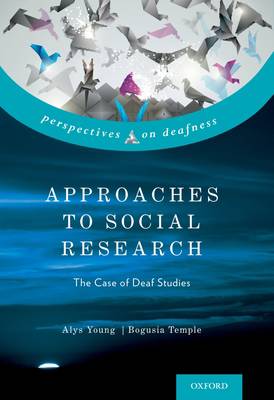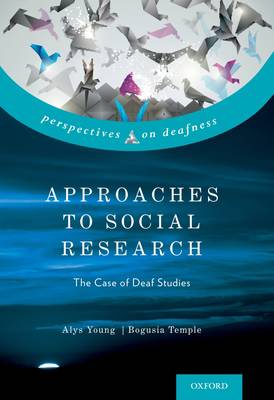
- Afhalen na 1 uur in een winkel met voorraad
- Gratis thuislevering in België vanaf € 30
- Ruim aanbod met 7 miljoen producten
- Afhalen na 1 uur in een winkel met voorraad
- Gratis thuislevering in België vanaf € 30
- Ruim aanbod met 7 miljoen producten
Zoeken
€ 177,45
+ 354 punten
Omschrijving
In Approaches to Social Research: The Case of Deaf Studies, Alys Young and Bogusia Temple explore the relationship between key methodological debates in social research and the special context of studies concerning d/Deaf people(s). The book is organized around 7 topics: being d/Deaf as a site of contested identity and representation; epistemology and the boundaries of claims for population specific and plural epistemologies; ethics and the implications of collective identity on standard ethical principles and practices; populations and sampling given the highly heterogeneous nature of d/Deaf people(s); narrative methodologies re-examined in light of the visual nature of signed languages; interpretation, translation and transcription and the context of multiple modalities; and information and communication technologies as transformative epistemologies. Through these themes, new aspects of old debates within social research become evident, and the authors challenge specialist field of studies by, with, and about d/Deaf people. Throughout the volume, the authors also show how the field provides challenges to established ways of thinking and working. The book is of interest to scholars within and outside of research concerning d/Deaf people(s), as well as practitioners in the fields of deaf education, social work and allied health professions.
Specificaties
Betrokkenen
- Auteur(s):
- Uitgeverij:
Inhoud
- Aantal bladzijden:
- 208
- Taal:
- Engels
- Reeks:
Eigenschappen
- Productcode (EAN):
- 9780199929535
- Verschijningsdatum:
- 5/05/2014
- Uitvoering:
- Hardcover
- Formaat:
- Genaaid
- Afmetingen:
- 163 mm x 236 mm
- Gewicht:
- 408 g

Alleen bij Standaard Boekhandel
+ 354 punten op je klantenkaart van Standaard Boekhandel
Beoordelingen
We publiceren alleen reviews die voldoen aan de voorwaarden voor reviews. Bekijk onze voorwaarden voor reviews.








